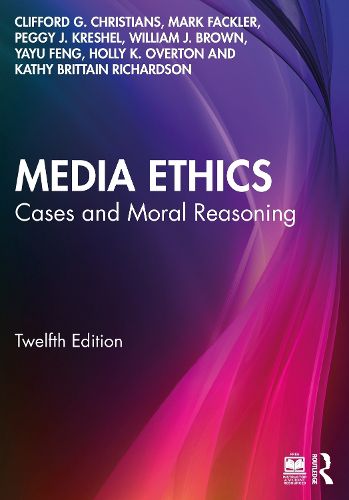Readings Newsletter
Become a Readings Member to make your shopping experience even easier.
Sign in or sign up for free!
You’re not far away from qualifying for FREE standard shipping within Australia
You’ve qualified for FREE standard shipping within Australia
The cart is loading…






This title is printed to order. This book may have been self-published. If so, we cannot guarantee the quality of the content. In the main most books will have gone through the editing process however some may not. We therefore suggest that you be aware of this before ordering this book. If in doubt check either the author or publisher’s details as we are unable to accept any returns unless they are faulty. Please contact us if you have any questions.
Through original case studies and analyses of real-life media experiences, Media Ethics challenges readers to think analytically and critically about ethical situations in mediated communication.
This textbook provides a comprehensive introduction to the theoretical principles of ethical philosophies, facilitating awareness and critical reflection of ethical issues. In each chapter, the authors examine case studies spanning several continents and geopolitical and cultural contexts. To provide a framework for analyzing the cases and exploring the steps in moral reasoning, the book introduces the Potter Box, a powerful tool for moral analysis. Focusing on a wide range of ethical issues faced by media practitioners and news organizations, the cases in this new twelfth edition include the most prominent concerns in journalism, broadcasting, advertising, public relations, and entertainment today. It explores new topics such as the use of ChatGPT in newsrooms, the privacy implications of biometric technologies, the role of public relations in political campaigns, and advertisers' approach to sustainability and climate change.
This core textbook is ideal for classes in media and communication ethics, journalism, public relations, advertising, entertainment media, and popular culture.
Online instructor and student resources, including video introductions to each chapter, PowerPoint slides, sample discussion and exam questions, and links to further resources, are available at www.routledgelearning.com/mediaethics.
$9.00 standard shipping within Australia
FREE standard shipping within Australia for orders over $100.00
Express & International shipping calculated at checkout
This title is printed to order. This book may have been self-published. If so, we cannot guarantee the quality of the content. In the main most books will have gone through the editing process however some may not. We therefore suggest that you be aware of this before ordering this book. If in doubt check either the author or publisher’s details as we are unable to accept any returns unless they are faulty. Please contact us if you have any questions.
Through original case studies and analyses of real-life media experiences, Media Ethics challenges readers to think analytically and critically about ethical situations in mediated communication.
This textbook provides a comprehensive introduction to the theoretical principles of ethical philosophies, facilitating awareness and critical reflection of ethical issues. In each chapter, the authors examine case studies spanning several continents and geopolitical and cultural contexts. To provide a framework for analyzing the cases and exploring the steps in moral reasoning, the book introduces the Potter Box, a powerful tool for moral analysis. Focusing on a wide range of ethical issues faced by media practitioners and news organizations, the cases in this new twelfth edition include the most prominent concerns in journalism, broadcasting, advertising, public relations, and entertainment today. It explores new topics such as the use of ChatGPT in newsrooms, the privacy implications of biometric technologies, the role of public relations in political campaigns, and advertisers' approach to sustainability and climate change.
This core textbook is ideal for classes in media and communication ethics, journalism, public relations, advertising, entertainment media, and popular culture.
Online instructor and student resources, including video introductions to each chapter, PowerPoint slides, sample discussion and exam questions, and links to further resources, are available at www.routledgelearning.com/mediaethics.